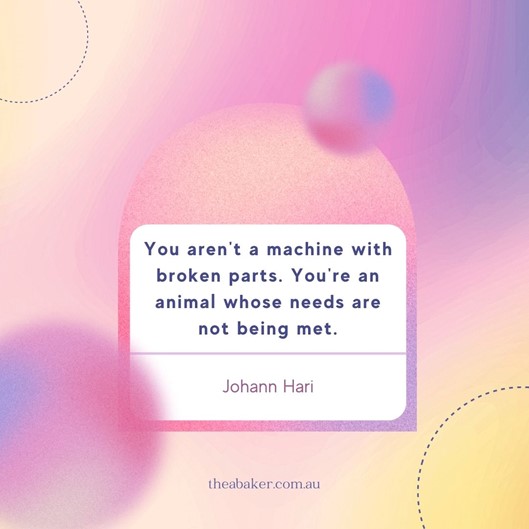Connections Matter
Connections Matter
Australia holds an unenviable position globally as second-most medicated nation for depression and anxiety. For a nation that is proud to punch way above its weight on the sporting field on the big stage like the Olympics, when it comes to mental health pretty unenviable position to hold. And I suspect that in Melbourne and maybe Sydney after the last two years of lockdowns things might be worse now than ever.
One of the big drivers of soaring rates of depression and anxiety in Australia is the simultaneous rise in social fragmentation and associated rise in loneliness. The journalist, Johann Hari (writer of an exceptional book, Lost Connections) writes, “Human beings evolved to live in closely knit tribes that were constantly co-operating. We only survived as a species because we could work together so tightly, and take down animals bigger and stronger than us. Just as a bee’s instincts are to connect with a hive, a human’s instincts are to connect with a tribe.” And whilst we’ve seen increasing numbers of people separated from their families (their tribes), due to a host reasons including increased global migration, social and financial pressures in recent decades, we have all endured one of the most profound social isolation experiences in living memory during the pandemic.
It is no coincidence that rates of depression and anxiety skyrocketed during lockdown and we saw higher than ever volumes of calls to all the helplines out there (Lifeline, Beyond Blue etc). We didn’t all suddenly experience some strange chemical brain conniption – we became depressed because we are human beings with psychological needs based on the fundamental foundation of human interaction and connection. We are born seeking eye-to-eye contact with our mothers. Just watch a newborn sometime and it will blow you away when there is the recognition that comes with seeing their mother and being seen in return.
As Beyond Blue says, “Connections matter. Strong ties with family, friends and the community provide us with happiness, security, support and a sense of purpose. Being connected to others is important for our mental and physical wellbeing and can be a protective factor against anxiety and depression.” Hari writes, “that grief and depression have the same symptoms isn’t a coincidence. Depression is a form of grief – for your life not going as it should; for your psychological needs not being met. With grief for somebody who has died, we offer love and support to the people who remain. With grief for our lives going wrong, there’s a different solution – one that is lying there, waiting for us. It is a program of deep reconnection with the things that really matter in life.”
The research is out there, we know loneliness has a direct impact on our physical and mental health and wellbeing, so what can we do to improve our connections to others:
- Consider volunteering at a not-for-profit organization near you. Helping others is a rewarding way to build friendships and connect with others.
- Consider joining a local group, like a book club or hiking group, that meets regularly. Routine interaction is a great way to get comfortable with socialising and getting to know others.
- Try to find an engaging activity in your area and consider signing up. Common interests are a great way to bond and form relationships.
- When engaging in conversations, try to actively listen. The more interest you display, the more genuine you’ll come across. Try to ask questions, so the other person knows you’re listening.
- When you enroll in a class or are scheduled to meet for a bike ride, try to avoid cancelling. Doing this repeatedly can only delay connecting and engage with others and causes a bit of a negative feedback loop in your brain!
- Try to get more physical. Regardless of the type of relationship, a hug can go a long way. Touch can deepen our relationship bonds (as long as the other person is willing of course).
If you want to explore your connections and how they could be improved we have a team of therapists at Thea Baker Wellbeing – please reach out to us at: hello@theabaker.com.au / 03 9077 8194.


